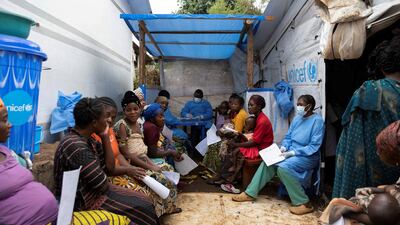An mpox vaccine has been approved for the first time – a move expected to improve access to the drug and slow the epidemic in Africa, the World Health Organisation said on Friday.
The approval, known as a pre-qualification, came as the first batches of MVA-BN vaccines arrived in the Democratic Republic of Congo, the epicentre of the disease outbreak, and Morocco confirmed a case of Mpox in a man in Marrakesh.
“This first prequalification of a vaccine against mpox is an important step in our fight against the disease, both in the context of the current outbreaks in Africa, and in future,” WHO chief Tedros Adhanom Ghebreyesus said.
“We now need urgent scale-up in procurement, donations and roll-out to ensure equitable access to vaccines where they are needed most … to prevent infections, stop transmission and save lives.”
Across the continent there were 107 new mpox-related deaths in the previous week, the regional health body has said.

“We lost 107 [people]. It’s too much. It’s not acceptable,” said Dr Jean Kaseya, director general of the Africa Centre for Disease Control and Prevention, as he emphasised the need for stronger cross-border surveillance.
A place on the WHO's prequalification list paves the way for the United Nations and international agencies to buy the drug. The list is also used by lower-income countries without the means to carry out their own drug evaluation testing.
“The WHO prequalification of the MVA-BN vaccine will help accelerate continuing procurement of the mpox vaccines by governments and international agencies … on the front lines of the continuing emergency in Africa and beyond,” said Yukiko Nakatani, WHO's assistant chief in charge of access to medicines and health products.
Mpox belongs to the same family of viruses as smallpox but causes milder symptoms like fever, chills and body aches. People with more serious cases can develop lesions on the face, hands, chest and genitals.
The vaccine can be administered to people over the age of 18 as a two-dose injection given four weeks apart. As most mpox cases and deaths in the DRC are children, WHO stressed that the vaccine could also be used “off-label” for infants, children and adolescents, and pregnant and immunocompromised people.
“This means vaccine use is recommended in outbreak settings where the benefits of vaccination outweigh the potential risks,” WHO said.
The organisation declared an international emergency over mpox last month, concerned by the surge in cases of the new clade 1b strain in the DR Congo and its spread to nearby countries. DR Congo has recorded nearly 22,000 cases and 716 deaths linked to the virus since January. About 200,000 vaccine doses have been delivered to the country so far by the European Union, and 50,000 from the United States.


